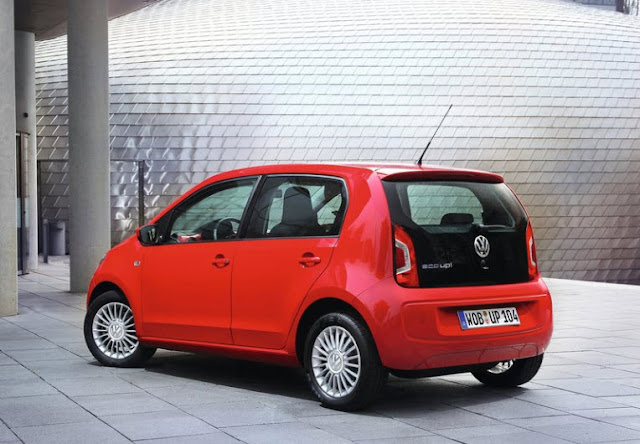
Car Barn Sport | Volkswagen Eco Up (2013) | The latest version of the Volkswagen Eco Up Now the world must continue to reduce the size of a fuel natural way, and Volkswagen is a car manufacturer involved to join and support fuel consuming car show with a four-seater only 2,9 kg of natural gas per 100 kilometers, which corresponds to CO2 emissions of just 72 g / km. and money was spent to save enough. in the German state, depending on the distance of 110 miles only need money to 3 euros Eco Car.

new methods for the production of biomethane get the weeds further reduce the dependence of conventional gas. This biomass could theoretically power 4 million natural gas vehicles. The first factory to produce biomethane from straw in Germany since February 2012. Gas also offers the possibility of storing electricity from renewable sources such as wind power. Volkswagen has equipped the vehicles with gas engines from the 1990s first as a renovation in collaboration with IAV subsidiary in Berlin. But with the growth of natural gas vehicles, Volkswagen has always worked on the solutions of the original system. One of the objectives was to minimize the effects of natural gas reservoirs inside. The first model of a new car has been designed for natural gas was 2002 Golf Estate 2.0 Bifuel - driving a natural gas vehicle in the compact segment. Significant additional monitoring milestones in 2006 with the introduction of market Caddy EcoFuel 2.0 (Volkswagen Commercial Vehicles) and Touran 2.0 EcoFuel - these two models of Volkswagen expands natural gas segments versatile compact van van in the city.

Today at the end of the year 2012 the company offers six vehicles powered by natural gas in different classes: the Caddy Caddy Maxi 2.0 EcoFuel extended 2.0 EcoFuel (each with 80 kW / 109 hp), the 1 1 , 4 TSI Eco Fuel Touran, Passat and Passat EcoFuel 4 (each kW 110/150 hp) and the new eco up! (50 kW / 68 hp). Natural gas has an energy content significantly higher than gasoline or diesel. 1.0 kg of natural gas equivalent 1.3-liter diesel or 1.5-liter gasoline energy content of 1.0 kg of natural gas equal to 11.69 kWh, the relative amount of diesel fuel is 9, 86 kWh, the energy content of gasoline is 8.77 kWh. In addition, natural gas has the advantage that the alternative CO2-neutral renewable resources and then burnt Available: by burning biomethane produced industrially,

for example has the same chemical structure of natural gas the amount of CO2 is released amount, which has not already occupied by the plants during their growth. Biomethane from plant by-products of the food and not the plant, which will receive any kind of competition in the food chain excludes On the way to a future independent of fossil fuel, natural gas and Biomethane as well as hydrogen and methane produced by electrolysis will be key. Develop new car models, such as stamp Volkswagen up!, Promises significant advances in gas production and CO2-neutral infrastructure expansion of the charging station and government support for this type of device own significant percentage of natural gas vehicles in large parts of Europe.

On the other side of the Alps, the stock has doubled in natural gas vehicles from 382,000 to 785,000 cars between 2005 and 2011. Here, natural gas vehicles are eligible for tax relief, reducing the purchase of new vehicles and exemptions from certain traffic laws. In addition, extension of the network of charging stations gas is produced. Germany, but the potential is not exhausted, although some gas suppliers already offer discounts of up to € 1,250 for the purchase of a new car with a natural gas engine, fuel is cheaper than gasoline or diesel, due to a reduced rate of energy and the number of stations for natural gas has increased to 911 (October 2012). In light of these facts is the fuel strategy of the Federal Republic of Germany, the amount of natural gas vehicles will increase by 4 per cent in 2020 that some 1.4 million vehicles.

Even if natural gas "pure" is used, CO2 emissions are reduced by 24 percent compared to gasoline engines. During the execution of pure biomethane vehicles emit up to 97 percent less CO2! In a well-to-wheel analysis (original commodity final drive), CO2 emissions are comparable to "to those of technology, fuel cell or battery electric vehicles - provided "electricity and hydrogen is produced from renewable sources", the German Energy Agency (dena). World's natural gas reserves are estimated at 525 billion m3 (from 2009) and about 3,000 billion m3 of this amount is extracted annually. Thus, the gas well is completed. This is a preview of Berlin-based organization dena German market for natural gas vehicles for 2020 that much more important: "Although it reached more than 4 percent of the target, all natural gas vehicles are principle supplied with pure biomethane in 2020.

Today, biomethane is a quarter of natural gas available charging stations in Germany, even more than 100 stations are already mixed pure biomethane. The company specializes in the production of biomethane from materials such as manure, slaughterhouse waste, organic waste and straw renewable energy that does not stop the production of food. In the opposite direction, the stored gas used to generate electrical installations. The electricity can then be used to drive electric cars especially for traveling short distances or it can be used as fuel for vehicles, fuel cells and gas that can travel long distances.

Find Car Barn Sport
Find Car Barn Sport
No comments:
Post a Comment